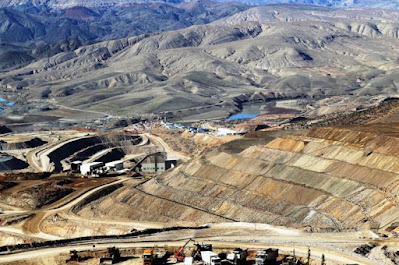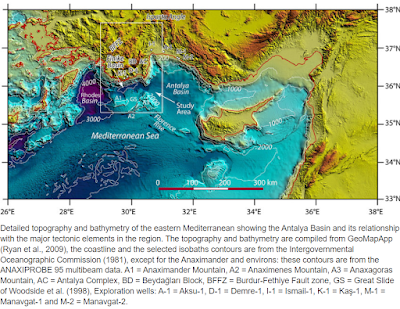The Zohr Field
The Zohr Field discovered in Egypt’s Nile Delta does not extend to Cyprus island’s EEZ
Existing maps show that the whole gas accumulation is contained in Egyptian EEZ waters.
Cyprus is deep water frontier area but the Cyprian Arc might have created the bathymetrical conditions which allowed the Eratosthenes Carbonate Platform to grow laterally onto the nearby oceanic crust.As the hydrocarbon system for Zohr comprises a biogenic gas source from the enclosing Oligocene and Miocene shales,and a top seal from ubiquitous thick Messinian halite, there is a high probability that the Zohr play is very repeatable on a very large scale both in Egypt and Cyprus.
My view;
Analysing petroleum potential -Evaluating the prospect before drilling the well.
The interpretation of seismic data is an extremely delicate phase of the exploration process. Petroleum exploration, as stressed on several occasions, has an inherent element of risk, since it operates on the basis of probabilistic scenarios.
It is never certain that a well will lead to the discovery of hydrocarbons, even if the geological model contains all the parameter for this to be the case. This element of risk cannot be avoided, but it can be successfully managed to optimize results.
According to the universally accepted definition, exploration is a phase of the petroleum cycle aimed at finding hydrocarbon accumulations, which to this end makes use of various scientific disciplines.
The explorationist is a geologist who uses the data obtained with various methodologies to develop a geological model of the area, and who formulates working hypotheses on the basis of all the geological and geophysical data collected, evaluated within a general context. In the context of an oil company’s activities, the role of exploration is to provide the information required to exploit the best opportunities presented in the choice of areas, and to manage research operations on the blocks acquired. Exploration is responsible for managing the risk inherent in this activity, selecting the best of a range of options in probabilistic and economic terms.
A number of factors allowing us to quantify the probability of success (discovery of hydrocarbons) or failure (dry well) must therefore be taken into account.In some cases, an idea of the probability of success in drilling a well in a given basin can be obtained by using historical statistics on past wells drilled in the area; however, this method is not particularly reliable.
A number of conditions are required for an accumulation to form: the presence of a source rock able to generate and release hydrocarbons; a pathway allowing the hydrocarbons to migrate; the presence of a reservoir rock, covered by an impermeable seal, to capture and preserve the hydrocarbons after migration. If just one of these elements is lacking, the probability of finding hydrocarbons is virtually "NIL". The presence of each of these conditions, in the relevant geological period, is associated with a probability: the product of these probabilities gives the probability of successful hydrocarbon discovery.



Comments
Post a Comment